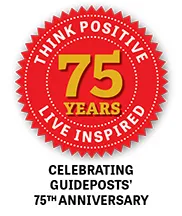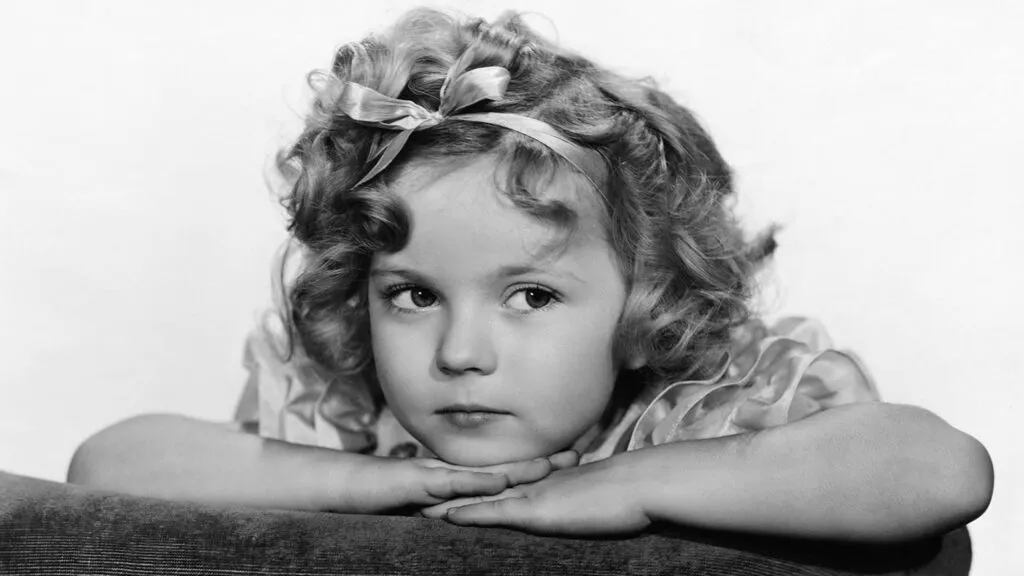When we drove away from the house on the hill, we left her standing in the California sunshine, a pretty woman in her mid-thirties with blue eyes and chestnut hair and a kind of cheerful serenity about her. Ahead of us, on the horizon, we could see the soaring San Francisco Bay Bridge.
“What are you frowning about?” my wife asked. “That was a wonderful visit. And she’s so friendly and relaxed and … and normal.”
“Yes,” I said, “Completely. That’s the trouble.”

“I agree with you,” I said. “But as a writer I have a problem. Happiness is tough to write about. It’s like describing a sunset. Once you’ve said it’s beautiful, you’ve said it.”
“There’s a little three-letter word,” my wife said, “that you can apply to anything: why. Why is a sunset? Why is happiness? Why, specifically, is Mrs. Charles Black, formerly the famous Shirley Temple, now a completely balanced and fulfilled human being? Why?”
“She didn’t tell us,” I said glumly.
“Ah,” said my wife, “but she did. She told us, and her house told us, and the pictures of her family told us, and her flowers and her books told us, and her child’s lavender bedroom told us, and her bright sparkling kitchen told us … oh, hundreds of things! If you’d just stop being difficult and think back, you’d see…”
“It’s good to see you,” Shirley Temple had said, “although things are a bit hectic around here. Lori—she’s our 10-year-old—has the measles, and I’m feeling a little headachy myself … I don’t think I’ve ever had them. Have you? That’s good! Come and have some coffee.”
To a writer interviewing a celebrity—or anyone, for that matter—first impressions are important. And they’re not arrived at consciously.
You see your subject; you’re aware of the background; you hear the first conventional phrases. But all the time you are listening on a kind of psychic level, groping for the essence of the person.
This woman: friendly, outgoing, not shy, no self-consciousness, no wariness. This house: comfortable, but not pretentious. Neatness and quietness. A warm center with a feeling of distance surrounding it, perhaps because it’s a hill-top home with a far-reaching view…
“Those pictures?” said Shirley Temple. “Yes, everyone looks happy because they were happy occasions. One was the golden wedding anniversary of my parents. The other was the golden wedding anniversary of my husband Charlie’s parents.
“Imagine having two such events in the same family within six months! And everybody’s still going strong.”
Fifty years and 50 years: a century of wisdom and happiness to draw on. That explains a lot. You can inherit certain things without even knowing that you’ve inherited them: outgoingness, good manners, an instinctive concern for other people, a sense of obligation to life, a feeling of gratitude…
“I’ve been terribly lucky,” Shirley Temple said. “I’ve bad such a wonderful life that the few mishaps or misfortunes seem very small.
“Think of all the things I’ve had! Parents who were strong and wise enough to protect me from the pressures that might have been damaging when I was a little girl. A marvelous girls’ school—Westlake—when I was 12 that brought me out of the make-believe world I’d lived in for so long.
“Now a marriage that’s completely happy. Charlie and I have backgrounds and values so similar that we even think alike! And, of course, three wonderful children.
“Then I have my community activities: I work as a volunteer every Monday at the Children’s Health Council in Palo Alto. And my occasional television work; I like that, so long as it doesn’t interfere with my family. If I thought it bothered Charlie or upset tile children I’d give it up tomorrow.”
Values: a key word when it comes to this business of happiness. You have to know what you want froth life, for yourself, and for others. Take the value of individuality, for instance…
“Charlie and I,” said Shirley Temple, “have a horror of forcing a child into a pattern that may please the parent but is all wrong for the child. We think children should be allowed to develop their own personalities in their own way—within a framework of good manners and good behavior, of course.
“I still get letters, sometimes, from doting mothers who tell me that their little girl looks just like the Shirley Temple of 30 years ago and has even learned some of my old dance routines.
“I always try to discourage them. The little girl that I once was had her place in time and in show business, but she’s gone now, and so is that era.”
Or the value of shared affection:
“Charlie and I almost always eat supper early with the children. We feel that if we all can be together for at least one hour a day, we can give the children a sense of security about family life that they can get in no other way.
“We try to keep that meal apart as a sort of special family hour. No television, no telephone calls, no outside interruptions. We take turns saying a simple grace. Sometimes I read from a set of Bible stories that I loved as a child. My children love them too.”
And the value of perspective:
“When we moved into this house a few years ago, we brought with us a lot of scrapbooks from my child-actress days. And Charlie suggested keeping them here in the living room, but I asked him to put them in the attic.
“They may interest our grandchildren some day. But I believe you have to live in the present, not the past or even the future.
“Charlie’s mother tells a story that expresses my philosophy very well. Once, when he was little, he asked her to name the happiest moment of her life. ‘Why this one, right now,’ she said. ‘But what about the day you were married?’ Charlie wanted to know.
“‘Well.’ she said, ‘my happiest moment then was right then. You can only live the moment you’re living in. So to me that’s always the happiest moment.’ And she’s right, you know: the happiest moment is now!”
The happiest moment is now. Maybe that’s her secret. Maybe that’s why she’s as serene and adjusted and well-balanced as she is.
Ahead of us now the skyscrapers of San Francisco were standing up to greet us. In a few more hours my wife and I would be home again with our own children, our own way of life.
To be yourself, not some artificially assumed personality. To live one day at a time. To accept the joy of being alive in the one moment when you can really feel it—the moment that is now…
“You’ve stopped frowning,” my wife said. “It was a good visit, wasn’t it?”
“Yes,” I said. “Very good.”
For more inspiring stories, subscribe to Guideposts magazine.






